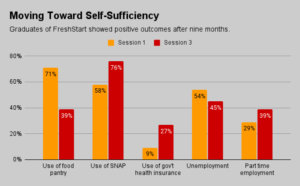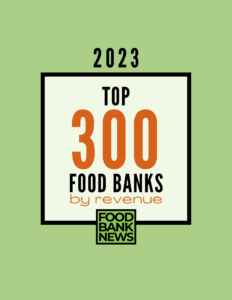New York City-based WhyHunger has always had an atypical way of addressing hunger, and now it has a new Executive Director to carry out that approach.
Jenique Jones became the nonprofit’s leader over the summer, taking the place of Noreen Springstead who spent a 30-year career at WhyHunger before becoming President and CEO of Partnership for a Healthier America. Jones joins from City Harvest, New York’s first and largest food rescue organization, where she served most recently as Vice President of Program Operations and Policy.
While Jones oversaw the distribution of about 100 million pounds of food a year at City Harvest, distributing food is not the point at WhyHunger. “We are not a food bank,” said Jones of WhyHunger, which had $7 million of revenue in 2022. Rather, WhyHunger seeks out community solutions rooted in justice as a resolution to hunger.

Said Jones of WhyHunger’s mission: “The people who are most impacted by hunger are also the people who are best equipped to respond. And so we give those people resources to do just that. They know their communities better than we do. We are a support to the grassroots organizations that are seeking to end hunger in their communities.”
In contrast to the nation’s food banks, which are highly localized, WhyHunger operates in 23 countries around the world, mostly seeking to increase the impact of agroecology, a form of small-scale sustainable farming. Jones has some thoughts about how to become more systematic in that work, including by potentially narrowing its focus to certain areas, and by hiring a more global staff. “I really want us to be a true global organization, in terms of who we work with and where we are,” she said.
Domestically, WhyHunger will continue to support rural communities, especially Black and Bipoc farmers. Jones is also particularly interested in strengthening WhyHunger’s approach to government policy and advocacy. “We really need people on the ground fighting for some changes,” she said. One common-sense initiative would be to move away from using the federal poverty level as a qualification for government support, given that the cost of living varies so much from location to location, she said.
In the meantime, Jones is clear-eyed about the need for funding to support the grassroots, community-level work that WhyHunger sees as essential for social change. “We want to raise more money so we can support more partners,” she said. – C.C.
Like what you’re reading?
Support Food Bank News
This article was made possible by the readers who support Food Bank News, a national, editorially independent, nonprofit media organization. Food Bank News is not funded by any government agencies, nor is it part of a larger association or corporation. Your support helps ensure our continued solutions-oriented coverage of best practices in hunger relief. Thank you!
Connect with Us:










